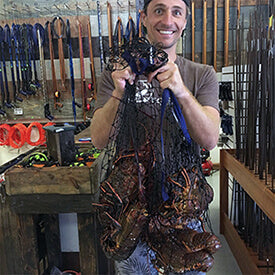
Top Spearfishing Tips for Beginners
Have you ever been fishing and wondered what it was like down there, under the water? Seen fish on the graph but been unable to convince them to bite? Spearfishing might be the answer for you!
If you've ever thought about getting into the world of spearfishing, you're in for a lot of fun. However, it's crucial to ensure that you're fully equipped and well-versed in the fundamentals of spearfishing. From obtaining the necessary equipment to learning techniques for safety and proper hunting, these essential tips are tailored to assist beginner spearos in embarking on this exciting journey.
Spearfishing has a rich history that dates back much further than one might imagine. This ancient method of hunting can be traced back 16,000 years, evident even in prehistoric cave art. While spearfishing hasn't gained the same widespread popularity as other outdoor activities in the United States, it maintains a dedicated community of active spearos.
1 - Equip yourself with proper gear
Thankfully, you don't need 10k worth of spearfishing equipment to thrive as a spear-fisher. However, you will need the right, high-quality gear to ensure safety and success during your expeditions. Things you can't cheap out on include: your mask, fins, a quick-release weightbelt, and a proper wetsuit for the temperature. You should always dive with a dive knife to quickly dispatch fish and to cut any lines you might get tangled in on the bottom. If you're just starting out, feel free to reach out to us for guidance on the essential equipment required.
2 - Familiarize yourself with spearfishing regulations
You can't just jump into any body of water and fish wherever you want, shooting anything that swims. Just like with hook and line fishing, it's important to educate yourself about the sport and local spearfishing regulations. Do some online research and seek advice from seasoned members of the spearfishing community to gain insights into the relevant laws, rules, and allowed locations for diving.
3 - Monitor weather
Diving in a storm is far from advisable. Checking the weather conditions a few hours before your trip is a simple yet vital step to prevent you from getting caught out in bad conditions. If there's a possibility of rough weather, plan another day to go out. As you go out more, you'll start to develop a sense of what weather patterns correlate with good visibility and what weather to avoid. Remember, no dive trip is worth your life.
4 - Never dive alone—always bring a buddy
Regardless of your level of experience, diving alone is a recipe for disaster. In 2015, the untouchable world record female freediver Natalia Molchanova dove without a safety off the coast of Spain and died. A competent safety/buddy who can assist you in case of any issues will help keep you safe in the water. In case of equipment malfunction, entanglement, or any unexpected mishaps, having immediate assistance on hand is essential.
